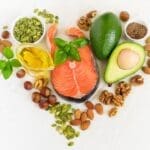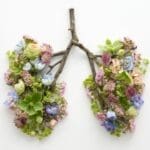Understanding Estrogen in Men
Estrogen isn’t exclusive to women. Men naturally produce estrogen through the conversion of testosterone via an enzyme called aromatase. Small amounts of estrogen are vital for men, supporting brain function, bone health, and even libido. But when estrogen levels become too high or too low, problems start to arise.
The Silent Symptoms of High Estrogen in Men
Many men are unaware that they might be struggling with high estrogen because the symptoms are often mistaken for other health issues. Here’s how elevated estrogen can impact men:
- Increased Body Fat (Especially Around the Chest and Hips)
High estrogen can promote fat storage in areas typically associated with female fat distribution, such as the chest (leading to gynecomastia, or “man boobs”) and hips. - Low Testosterone and Reduced Libido
Excess estrogen suppresses testosterone production, which can lead to a lowered sex drive, erectile dysfunction, and infertility. - Mood Swings and Irritability
Estrogen affects neurotransmitters like serotonin. High levels can cause mood instability, anxiety, and even depression. - Fatigue and Brain Fog
Men with elevated estrogen may feel constantly tired and struggle with concentration due to hormonal imbalances disrupting energy metabolism. - Prostate Problems
Estrogen dominance has been linked to an increased risk of benign prostatic hyperplasia (BPH) and may play a role in prostate cancer development. - Water Retention and Bloating
High estrogen can cause the body to hold onto excess water, leading to bloating and discomfort.
Causes of Elevated Estrogen in Men
So, why are more men facing estrogen imbalances today? Several lifestyle and environmental factors contribute:
- Diet High in Processed Foods and Phytoestrogen-Rich Products:
Phytoestrogens are plant compounds that mimic estrogen in the body. Consuming these in excess can disrupt hormonal balance. Common sources include:- Soy Products: Tofu, soy milk, edamame, tempeh, soy protein isolate (found in protein bars and powders), and soy-based meat alternatives.
- Flaxseeds: One of the richest sources of lignans, a type of phytoestrogen.
- Sesame Seeds: Also high in lignans, contributing to increased estrogen activity.
- Legumes: Chickpeas, lentils, beans, and peas contain moderate amounts of phytoestrogens.
- Alfalfa Sprouts: A lesser-known but potent source of phytoestrogens.
- Licorice Root: Found in teas, supplements, and candy, it can significantly affect hormone levels.
- Dried Fruits: Especially apricots, dates, and prunes, which contain concentrated amounts of phytoestrogens.
- Exposure to Endocrine Disruptors: Chemicals in plastics (like BPA), pesticides, and even personal care products often contain xenoestrogens—synthetic compounds that act like estrogen.
- Alcohol Consumption: Excessive alcohol impairs liver function, reducing the body’s ability to metabolize estrogen efficiently.
- Obesity: More body fat means more aromatase activity, converting testosterone to estrogen.
- Medications: Certain medications, including some antidepressants and blood pressure drugs, can alter hormone levels.
The Dangers of Low Estrogen in Men
While high estrogen gets most of the attention, too little estrogen can also be harmful. Men need a balance. Low estrogen can lead to:
- Weakened Bones and Osteoporosis: Estrogen is essential for bone density. Men with low estrogen are at risk for fractures and osteoporosis.
- Joint Pain: A deficiency can cause joint stiffness and pain.
- Decreased Sexual Function: Just like high estrogen, low estrogen can also impact libido and sexual performance.
Balancing Estrogen: How to Protect Your Health
Men don’t need to eliminate estrogen—they need to balance it. Here are practical ways to keep estrogen in check:
- Maintain a Healthy Weight: Reducing excess body fat limits the conversion of testosterone to estrogen.
- Eat Cruciferous Vegetables: Broccoli, cauliflower, and Brussels sprouts contain compounds that support estrogen metabolism.
- Avoid Plastics: Use glass or stainless-steel containers instead of plastic to reduce exposure to BPA and other endocrine disruptors.
- Limit Alcohol and Processed Foods: Protect your liver and reduce foods that can elevate estrogen levels.
- Consider Natural Supplements: Nutrients like zinc and magnesium can support healthy hormone balance.
- Exercise Regularly: Strength training naturally boosts testosterone and helps manage estrogen levels.
When to See a Doctor
If you’re experiencing symptoms like fatigue, weight gain, low libido, or mood swings, it might be time to check your hormone levels. A simple blood test can reveal if your estrogen or testosterone levels are out of balance.
In some cases, healthcare providers might recommend medications like aromatase inhibitors to reduce estrogen production, but lifestyle changes should be the foundation of hormone health.

Estrogen isn’t just a “women’s hormone”—it’s a crucial part of men’s health. But when it’s out of balance, it can quietly disrupt everything from your energy and mood to your weight and sexual health. The good news? With the right lifestyle choices, men can restore hormonal balance and protect their long-term health.
Don’t ignore the signs. Pay attention to what your body is telling you and take proactive steps to feel your best.













